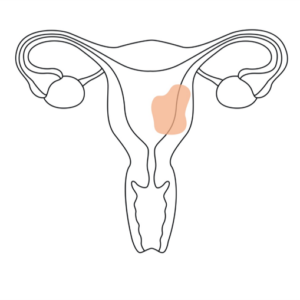
ENDOMETRIAL CANCER

Endometrial cancer is also known as uterine cancer or uterine body cancer. The cancer develops in the endometrium, the inner lining of the uterus. This is the tissue that builds up every month during the menstrual cycle and is shed during menstruation, unless pregnancy occurs.
Endometrial cancer is one of the most common types of gynecological cancer. On average, there are approximately 10,500 new cases per year in Germany. In most cases, women in menopause or post-menopause are affected. The average age of onset is 69 years.
In recent years, both the understanding and the diagnosis and treatment of uterine cancer have changed significantly, as new research findings are increasingly being incorporated into treatment methods and improving the chances of recovery.
The exact cause of uterine cancer is not always clear. It is believed that various factors can contribute to the development of cancer cells in the endometrium.
Hormonal imbalances: Elevated estrogen levels can increase the risk of endometrial cancer. This imbalance can be caused by various factors, such as late menopause, early menarche, irregular menstrual cycles, or the use of hormone replacement therapy without progesterone.
Age: Endometrial cancer usually occurs in women after menopause. The risk increases with age.
Family history: Women with a family history of endometrial cancer or certain hereditary genetic syndromes, such as Lynch syndrome, have a higher risk of developing the disease.
Tamoxifen: Women who take tamoxifen to treat or prevent breast cancer have a slightly increased risk of endometrial cancer.
Diabetes: Women with type 2 diabetes have an increased risk of endometrial cancer, possibly due to insulin-related growth factors.
Polycystic ovary syndrome (PCOS): Women with PCOS are more likely to have hormonal imbalances, which can increase the risk of endometrial cancer.
No pregnancies: Women who have never been pregnant may have a higher risk of endometrial cancer.
Radiation therapy: Women who have previously received radiation therapy in the pelvic area, for example to treat cervical cancer, may have an increased risk of endometrial cancer.
Morbid obesity (BMI over 30): Obesity leads to increased production of estrogen in fatty tissue, which in turn causes a hormonal imbalance and increases the risk of endometrial cancer.
Please remember that the presence of these risk factors does not necessarily mean that a woman will develop endometrial cancer. Many women with one or more of these risk factors never develop the disease. Nevertheless, it is advisable to undergo regular screening to enable early detection and treatment.
Endometrial cancer can cause various symptoms. However, especially in the early stages of the disease, there are few or no specific symptoms.
If symptoms do occur, they may include the following:
- Bleeding after menopause (when menstruation has actually stopped for at least 12 consecutive months)
- Vaginal bleeding outside of normal menstrual cycles.
- Pelvic pain
- Pain during sexual intercourse
- Unexplained weight loss
If you notice these or similar symptoms, consult your gynecologist. Especially if you have bleeding AFTER menopause, get it checked out quickly. When detected early, uterine cancer is often treatable and the chances of recovery are higher.
Endometrial cancer is diagnosed using various methods, which are often combined:
- Review of medical history and physical examination
- Transvaginal ultrasound to measure the thickness of the endometrium
- Examination of a tissue sample. To do this, a small piece of the endometrium is removed using a biopsy needle, a small spoon, or a suction device and analyzed under a microscope for cancer-related changes.
- In a procedure known as hysteroscopy, a thin, illuminated tube (hysteroscope) is inserted into the uterus to examine the endometrium and, if necessary, take tissue samples.
- Imaging techniques such as computed tomography (CT), magnetic resonance imaging (MRI), or positron emission tomography (PET) supplement the diagnosis. These are used to determine the stage of the cancer and its spread.
The treatment of uterine cancer depends on various factors, including the stage of the cancer, the degree of tumor aggressiveness, the patient’s state of health, and her personal preferences.
The standard surgery for endometrial cancer is complete removal of the uterus, known as a hysterectomy. Sometimes the ovaries and fallopian tubes must also be removed. In some cases, when the cancer is at a very early stage, partial removal of the uterus may be considered.
Radiation therapy, which destroys cancer cells or slows their growth, can be used before surgery (neoadjuvant), after surgery (adjuvant), or as a standalone treatment.
If the disease is advanced, chemotherapy is often used.
Hormone therapy is also frequently used to treat advanced endometrial cancer. It uses hormones or medications to lower estrogen levels and thus slow down or control the growth of cancer cells.
Targeted therapies are medications that specifically target certain molecules or proteins found in cancer cells. They can be used in some cases of advanced or recurrent endometrial cancer.
The choice of treatment always depends on the individual case and is usually determined by an interdisciplinary team of doctors, including gynecologists, oncologists, and radiation therapists. The goal of treatment is to remove the tumor, stop or slow the progression of the cancer, and minimize the risk of recurrence.
Talk to your doctors about the various options so that you can make the best decision for your individual case.
Research is continuously working on the further development of various treatment options for oncological diseases in general and gynecological diseases in particular.
- Genetic and molecular basis: As with other cancers, research is intensively engaged in better understanding the genetic and molecular basis of endometrial cancer in order to enable new therapeutic approaches.
- Biomarkers and personalized therapies: Research is focused on identifying biomarkers that can predict the risk of endometrial cancer and improve treatment outcomes. Personalized therapy could enable the development of treatment approaches that are specifically tailored to the individual characteristics of a tumor and the patient.
- Immunotherapy: There are high hopes for immunotherapy. It uses the body’s immune system to fight cancer cells and is already being used successfully to treat other types of cancer. Researchers are investigating the effectiveness of immunotherapies for endometrial cancer and how they could be integrated into standard treatment.
- Early detection and prevention: Developing better screening methods and prevention strategies is crucial to detecting or preventing endometrial cancer at an earlier stage.
Good to know
The role of genes: Most uterine cancers occur sporadically. Only five to ten percent of endometrial cancers are due to genetic mutations. People with Cowden syndrome or Lynch syndrome have an increased risk of several types of cancer, including endometrial and ovarian cancer. If you are diagnosed with endometrial cancer, be sure to ask your doctor if you have been tested for Lynch syndrome. A very small subgroup of patients with serous endometrial cancer may have an inherited underlying BRCA1 mutation as the cause of their disease, but there are no clear guidelines for genetic testing for BRCA1 mutations.
Protective effects: Taking birth control pills, pregnancy(ies), and physical activity reduce the risk of developing endometrial cancer.
